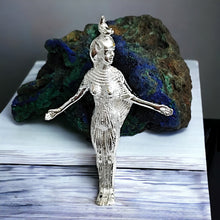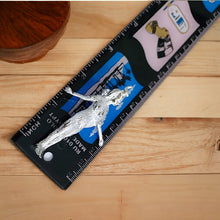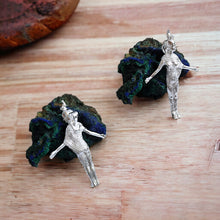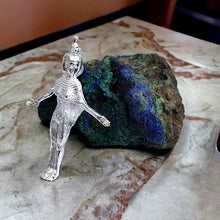The Silver Goddess Selket Pendant Necklace is a stunning piece inspired by ancient Egyptian mythology. Crafted in sterling silver, it pays homage to Selket, the goddess of scorpions and protection. This timeless accessory merges history with elegance, offering wearers a touch of divine charm and mystical allure.
- History: Inspired by ancient Egyptian mythology, specifically the goddess Selket, associated with protection and healing.
- Spiritually: Represents Selket's protective and healing energies, offering a sense of spiritual connection and guidance.
- Talisman: Considered a talisman for warding off negative energies and promoting well-being.
- Handmade: Crafted with care by skilled artisans, imbuing each piece with unique character and energy.
- Healing: Believed to possess healing properties, offering comfort and support during times of physical or emotional distress.
- Material: Made of silver, a metal associated with clarity, intuition, and reflection.
- Symbolism: Depicts Selket, symbolizing protection, healing, and transformation.
- How to Wear: Can be worn on any chain up to 5mm in thickness, allowing for versatile styling and personalization.
- Ideal Gift: Perfect for those seeking spiritual connection, protection, or healing; suitable for various occasions like birthdays, graduations, or spiritual milestones.
History Side For Those Who Are Interested
Selket, also known as Selqet or Selcis, is an ancient Egyptian goddess associated with protection, healing, and the afterlife. Her origins trace back to the earliest periods of Egyptian civilization, where she was revered as one of the principal deities within the pantheon.
The name "Selket" is believed to derive from the Egyptian word "selk," which means "to breathe" or "to live." This association with breath and life suggests her role as a protective deity, particularly in safeguarding individuals from venomous creatures and ensuring their well-being.
Selket is commonly depicted as a woman with the head of a scorpion or as a woman wearing a scorpion-shaped headdress. The scorpion, a creature with a potent sting, symbolizes both danger and protection in ancient Egyptian iconography. Selket's association with scorpions highlights her role as a guardian against their venomous sting, as well as her ability to provide healing and relief from their effects.
One of Selket's most significant roles was as a protector of the deceased during their journey through the afterlife. She was often invoked in funerary rituals and depicted on amulets and other protective charms buried with the dead. Selket's presence was believed to ward off evil spirits and ensure the safe passage of the soul into the realm of the gods.
Selket was also closely associated with childbirth and fertility. Her protective qualities extended to expectant mothers and newborn infants, offering them safeguarding against harm and ensuring their well-being during the vulnerable stages of birth and infancy.
In addition to her protective and healing attributes, Selket was sometimes linked with the concept of transformation and regeneration. This association likely stemmed from her connection to the cycle of life and death, as well as her role in facilitating the transition of the soul to the afterlife.
Throughout Egyptian history, Selket remained a popular and revered deity, often invoked in both personal and royal religious practices. Temples dedicated to her worship existed in various regions of Egypt, with some of the most prominent located in the city of Memphis and the Faiyum Oasis.
Selket's cult persisted through different periods of Egyptian history, including the Old Kingdom, Middle Kingdom, and New Kingdom, adapting and evolving alongside changes in religious beliefs and practices. Despite the eventual decline of ancient Egyptian religion following the spread of Christianity and Islam, Selket's legacy endures through archaeological discoveries, ancient texts, and modern interpretations of Egyptian mythology.








